The Checker Maven
The World's Most Widely Read Checkers and Draughts Publication
Bob Newell, Editor-in-Chief
Published every Saturday morning in Honolulu, Hawai`i
Noticing missing images? An explanation is here.
A Rush of Cold Air

In our main location here in North America, it's the time of year for those first gusts of really cold air, telling us that we've turned the corner towards winter, and we'll be spending more time indoors in front of the checkerboard. This month, to warm your interest, we have a speed problem that is instructive, interesting, and not all that hard--- if you don't get blown in the wrong direction.
We'll give you twenty seconds to gust through it and find the answer. To begin, just click on the link below to display the problem and start our cold-hearted Javascript clock.
November Speed Problem (fairly easy)
Got it? Click on Read More to breeze over to the solution.![]()
A Friendly Sitting

Our title for today's column comes from a rather old checker magazine, which states that the problem situation shown below came from an informal or "friendly" match played somewhere in Ohio back in the day. Certainly, checkers can be a most sociable pastime, and we would hope that we can all be friends, even given the rather intense competition and rivalries that the game can often engender.
The problem itself, of course, is rather "friendly" in its own right, and we don't think that you'll have a lot of trouble solving it.
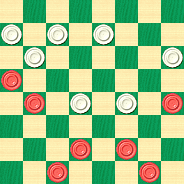
BLACK
Black to Play and Win
B:W28,27,26,24,21,15,14:B20,16,13,7,6,3,1.
Sit down, make friends with the problem, and then click on Read More to see the most agreeable solution.![]()
Henderson's Shot

As we continue our regular columns taken from Willie Ryan's Tricks Traps & Shots of the Checkerboard, this month we come to a situation that's a bit different. This time, Black plays a move that is good enough to draw, but only if he can find a spectacular shot--- of the checker variety, that is!
Here's Willie once again to tell us how it all takes place.
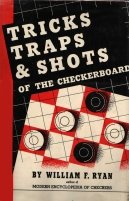
"Scotland has given birth to many of the World's great draughts players. Among them was Hugh Henderson of Muirkirk, who emigrated to America in 1910, settling down in Pittsburgh, Pennsylvania. He won the American Championship tournaments of 1912 and 1915, and for many years edited a widely read checker column in the Pittsburgh Leader, in which he revealed an immeasurable amount of original scientific play. The Henderson Shot, which we reproduce here, is one of his best-known examples of superscientific play.
| 10-15 | 17-14 | 7-10 |
| 23-18 | 6-9 | 14-7 |
| 12-16 | 24-19---A | 3-19 |
| 26-23 | 15-24 | 32-28---3 |
| 8-12 | 28-19 | 2-7---B |
| 30-26 | 11-16 | 21-17 |
| 16-20 | 25-21 | 7-10* |
| 21-17 | 1-6---2 | 29-25. |
| 9-13 | 19-15 | See the |
| diagram |
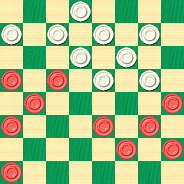
BLACK
Black to Play and Draw
B:W31,28,27,26,25,23,22,18,17:B20,19,16,13,12,10,9,6,5,4.
A---Black has a well-known one-move knockout if white tries 23-19 here, since 13-17! wins at once---1.
B---After this move, black's only out is via the Henderson Shot. Instead of 2-7, black has an easier road to a draw by 9-14!---4, 18-9, 5-14, 22-17, 13-22, 26-1, 19-26, 31-22, 16-19, 1-5, 12-16, 5-9, 4-8, 9-14, 8-12. L. C. Ginsberg."
1---Either 19-10 17-21 24-19 (other moves are possible but also lose) 21-30 26-23 11-15 18-11 9-25 29-22 7-14 Black Wins, or else 22-6? 1-17 19-10 7-30 Black Wins---Ed.
2---2-6 is preferred by the computer, who now thinks White has a tangible, though certainly not decisive, edge.---Ed.
3---Instead, 18-15 looks quite strong for White. The text move allows Black to get back in the game on the next move---Ed.
4---The computer finds that 4-8, among others, also draw. Of course, some draws are much easier to find over the board than others---Ed.
Black has made life difficult for himself. Can you help him out by finding the shot that leads to a draw? The play is not easy, but it can be done. Take a "shot" at it and then aim your mouse at Read More to see Willie's solution.![]()
New PDN Files Available

Thanks to the generosity and hard work of Checker Maven friend John Acker, we have a number of new PDN files available for your instruction and entertainment. Just click on the PDN link in the Downloads section in the right column, or click here.
Don't know about PDN files or how to use them? You'll find an explanatory link on the PDN download page.
Enjoy these new files, and again, thank you John!![]()
Negative Second Position

The concept of negative numbers is said to be due to the Hindu mathematician Brahmagupta, who defined them around the year 600 A.D; but the idea is even older, dating back at least to the Greek mathematician Diophantus, around 250 A.D., who wrote about "forthcomings" and "wantings" to represent the modern idea of positive and negative numbers.
An ancient idea indeed, although most historians believe the foundations of our game of checkers go back even further!
And this brings us to the point of today's Checker School session: a situation which as been referred to as Negative Second Position. No doubt you're familiar with the basics of the Second Position ending (it's been covered in a previous Checker School lesson); today's position changes, or perhaps negates, the value of a few of the pieces, changing White to Black, King to man, and vice-versa. If that's confusing, a look at the diagrammed position, attributed to W. Strickland, will clear it all up.
WHITE
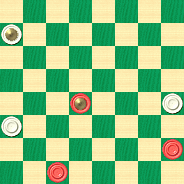
BLACK
Black to Play and Win
B:WK28,13,12:BK15,5,3.
Can you negate the difficulty of this problem and find the win? A negative attitude will never do! Think positively, find the answer, and then be certain to click on Read More to see the solution, a sample game, and detailed notes.![]()
Welcoming the New Year

Of course, we're welcoming the New Year on the Jewish calendar --- the year 5769, to be precise, an event celebrated by eating apples dipped in honey and hearing the blowing of the ram's horn, known as the "shofar" and pictured above.
The Checker Maven celebrates by bringing you an interesting (and not very difficult) checker problem in which all is not as it seems, and the obvious may not be obvious at all. Here's our position.
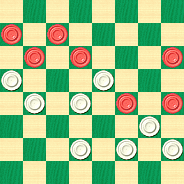
WHITE
White to Play and Win
W:W28,27,26,24,18,17,15,13:B20,19,12,10,9,6,5.
White is a man up, so why are we blowing our horn over this one, you may ask. Well, although the New Year has come quickly upon us as it always seems to do, haste is not advised in making your move here.
See if you can find the win--- as we said, it's not very difficult--- and also demonstrate what's wrong with the "obvious" move. Blow your own horn and then click on Read More for the complete solution. And have a good and a sweet year!![]()
All In A Row

We've chosen our title for today's very interesting problem from its appearance on the checkerboard, with three columns of pieces all in a nice tidy row.
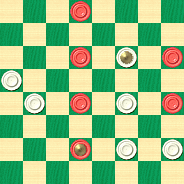
WHITE
White to Play and Draw
W:WK11,13,17,19,27,28:B2,10,12,18,20,K26.
This turns out to be another one of those studies with a lot of options to look at. But there is only one move to draw for White. Can you find it, and demonstrate a draw against any of several possible Black replies? Can you show how other first moves lose for White? This is a position that is full of surprises and exciting checker action. Get your ducks in a row, solve the problem, and then click on Read More for the solution and complete analysis.![]()
Bailey's Blackjack
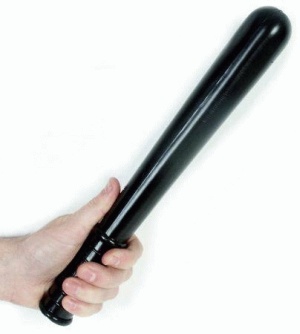
Willie Ryan never fails to please, and this month's installment from his classic Tricks Traps & Shots of the Checkerboard is no exception. While the pyrotechnics shown in today's position are not forced, they are by far the most spectacular way to wrap up a win, and the instructional value of Mr. Ryan's analysis is, as always, unmatchable.
Here's Willie once again:
"Ranking high among the classical bombshells of the board is this 11-piece sweep, credited to the late N. A. Bailey, of Rutland, Vermont. Although Bailey's blitz has been published many times, it has never been shown with the proper sequence of moves. As a result, the reader misses the scientific meaning of the preliminary moves leading up to the shot. Proceed with:
| 9-13 | 28-24 | 16-19 |
| 22-18 | 12-16---A | 23-16 |
| 10-15 | 24-19*---B | 12-19 |
| 18-14 | 8-12 | 30-26*---D |
| 15-18 | 19-15*---B | 2-6---2 |
| 24-20 | 4-8 | forming the |
| 6-9 | 26-22*---C | diagram. |
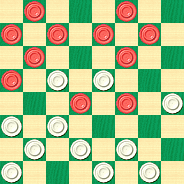
WHITE
White to Play and Win
W:W32,31,29,27,26,25,22,21,20,15,14:B19,18,13,11,9,8,7,6,5,3,1.
A---A losing move that can be tamed only by forcing black into the Bailey shot. The play from here to the finish is a first-class example of the indispensability of stroke technique in cracking a formational "dud" that otherwise would be drawable. The correct play to draw at A is: 1-6, 32-28, 6-10, 24-19, 10-17, 21-14, 11-16*, 20-11, 7-16, 19-15, 8-11, 15-8, 4-11, 28-24, 16-20, 14-10, 12-16, 23-14, 9-18, 25-22, 18-25, 29-22, 11-15, 26-23, 2-7, 30-26, 7-14, 22-18, 15-22, 26-10, 3-8, 10-7, 13-17, 7-3, 8-12, 3-7, 17-22, 7-10, 5-9,10-6, 9-14, 6-10, 14-17,10-14, 17-21,14-17, 22-25, 17-22, 25-30, 31-26, 16-19, 24-15, 12-16. Hugh McKean.
B---A meticulous probing of the position will prove that these moves are absolutely necessary to hold the win.
C---The correct and only move to win! Even Bailey, the author of this fine win, as well as others, prescribed 15-10 here, which allows black to get away by 16-19!---1
D---Stops 1-6 because of 14-10, and 19-24 because of 32-28."
1---This actually appears to allow Black to win! Computer analysis gives this possible line of play: 15-10 16-19 23x16 12x19 26-22 19-24 22x15 11x18 30-26 24-28 20-16 8-12 27-24 12x19 24x15 18-23 26x19 9x18 19-16 7x14 Black Wins--Ed.
2---1-6 holds out longer here but still loses; one line is 14-10 7x14 22-17 13x22 26x1 9-13 15-10 11-15 20-16 8-12 16-11 12-16 1-6 2x9 11-7 3-8 10-6 8-12 6-2 16-20 2-6 19-23 25-22 18x25 29x22 23-26 6-10 15-19 10-15 19-24 32-28 26-30 28x19 White Wins--Ed.
Can you find the flashy finish? When you've solved it, click on Read More for Willie's solution.![]()
Boxology
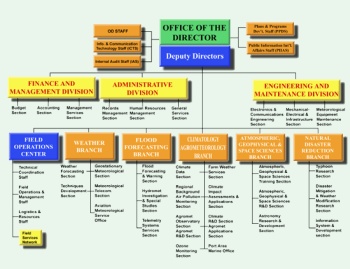
Fortunately, today we won't be discussing what is often known as "boxology" or the drawing of incredibly boring corporate organizational charts. But the term did come to mind when we looked at the "boxy" appearance of the pieces in today's edition of Checker School. The position is diagrammed below.

WHITE
White to Play and Draw
W:WK2,19,20:B11,12,K27.
Boxy, yes; boring, certainly not! Although the two White men seem quite boxed in, there is a clever draw in the offing, one that is easier to spot than usual for a Checker School problem.
Can you find the draw, or will you be relegated to the bottom of the pecking order? We certainly hope that won't be your fate, and in fact clicking on Read More will leap you at once to the top of the charts.![]()
Not Too Tough

Like the appetizing dinner pictured above, this month's speed problem is definitely not too tough; in fact, it's rather tender and juicy. So much so, in fact, that we think ten seconds to find the solution is ample time; we rather suspect that most of you will finish it off in half that interval.
When you're ready to feast on this one, click below.
September Speed Problem (easy)
When you've finished the main course, clicking on Read More will bring you dessert--- in the form of our solution, of course.
![]()
The Checker Maven is produced at editorial offices in Honolulu, Hawai`i, as a completely non-commercial public service from which no income is obtained or sought. Original material is Copyright © 2004-2026 Avi Gobbler Publishing. Other material is public domain, AI generated, as attributed, or licensed under CC1, CC2, CC3 or CC4. Information presented on this site is offered as-is, at no cost, and bears no express or implied warranty as to accuracy or usability. You agree that you use such information entirely at your own risk. No liabilities of any kind under any legal theory whatsoever are accepted. The Checker Maven is dedicated to the memory of Mr. Bob Newell, Sr.

